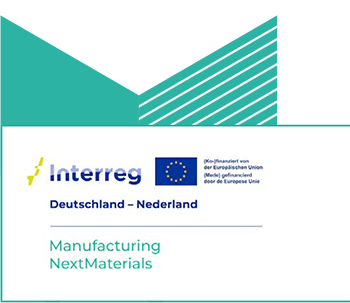
In the fast-paced world of advanced materials and manufacturing, small and medium-sized enterprises (SMEs) often face significant hurdles in scaling up from prototype development to full production. The Manufacturing NextMaterials (MNM) project, a collaborative initiative under the Interreg program, aims to bridge this gap, fostering innovation and economic growth in the Dutch-German border region. Judith Inberg from Oost NL and Joost van Lindert from Cato Composites shared their insights on the project’s objectives, benefits, and future prospects.
Judith Inberg explains that the MNM project is centred on providing flexible manufacturing technologies to SMEs for processing smart and sustainable materials into lightweight components, advanced battery systems, and sustainable energy solutions.
“We see that there is ample government support up to the prototype development stage. But after that, government support stops, and they struggle to scale up to production and reach the market,” Judith states. The MNM project aims to bridge this gap by equipping SMEs with the necessary tools to successfully bring their products to market, now and in the future.

The MNM project enhances cross-border cooperation, which is central to supporting SMEs. By combining competencies across borders, the project creates the synergy needed for developing production systems. “With this, we help SMEs not only find cooperation partners across borders and enter neighbouring markets but also provide a wide range of tools and support in designing and implementing test productions,” Judith notes. These opportunities are expected to strengthen the region’s innovative capacity and competitiveness, leading to more jobs and economic growth.
Core partners of the MNM project include Oost NL, NMWP.NRW, and BOM, focusing on business aspects like dealing with regulations and industry standards in foreign markets. On the technical side, six partners including knowledge institutes such as the Thermoplastic Composites Application Centre of Saxion University, Fraunhofer Innovation Platform at Twente University, and Cato Composites are crucial. These partners collaborate in lighthouse projects focusing on scaling up technical capabilities. They have established cross-border pilot facilities for composites test production, advanced battery production, and 3D printing support.

Joost van Lindert from Cato Composites highlights the main challenges SMEs face when moving from prototype stages to full production. “To set up successful production, SMEs need knowledge, tools, and funding,” he explains.
Without government support post-prototyping, many SMEs struggle to convince potential clients and investors to invest in production. Additionally, SMEs often lack the expertise to carry out test productions and navigate regulations and industry norms in foreign markets.
Looking ahead, Joost sees a bright future for composite materials, especially in terms of sustainability and efficiency. “Thermoplastic composites as structural and lightweight materials help reduce energy consumption for lightweight (electric) mobility and have specific properties like corrosion resistance,” he says. The growing range of biobased and recycled thermoplastic composites offers great opportunities for achieving energy transition and sustainability goals.
The MNM project is committed to directly collaborating with SMEs. Through workshops looking at scale-up challenges and opportunities for crossborder cooperation, SMEs can gain valuable insights and support. SMEs can apply for scale-up subprojects with cross-border partners, with potential funding up to €70,000 per subproject and a total budget of €1.3 million available.
Addressing the challenges of thermoplastic composites in production through pilot projects is crucial. Joost emphasises that many SMEs in the program area have developed smart, sustainable composite materials or have concrete ideas for application using these materials, but lack the resources and expertise to scale up to manufacturing. “By using the existing resources of Cato’s Thermoplastic Composites Manufacturing Solution Centre in Rheden and by setting up an additional efficient pilot TPC manufacturing line, we aim to support other SMEs in applying and scaling up circular and bio-based composites,” he states. This initiative hopes to pave the way for further innovation and initiatives.
The MNM Interreg initiative, with the support of Cato Composites and other key partners, is paving the way for innovative advancements and economic growth in the Dutch-German border region. By fostering cross-border collaboration and providing essential resources, the project aims to help SMEs overcome scale-up challenges and contribute to a sustainable future.


